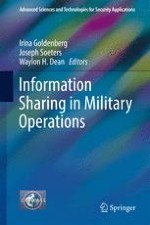2017 | OriginalPaper | Buchkapitel
5. Information Sharing Among Military Operational Staff: The French Officers’ Experience
verfasst von : Barbara Jankowski
Erschienen in: Information Sharing in Military Operations
Aktivieren Sie unsere intelligente Suche, um passende Fachinhalte oder Patente zu finden.
Wählen Sie Textabschnitte aus um mit Künstlicher Intelligenz passenden Patente zu finden. powered by
Markieren Sie Textabschnitte, um KI-gestützt weitere passende Inhalte zu finden. powered by
